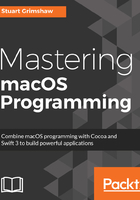
上QQ阅读APP看书,第一时间看更新
if else
The if, else, and if else statements work as they do in most C-based languages:
let x = getxFromSomewhere()
if x == 0
{
print("x is zero")
}
else if x < 0
{
print("x is negative")
}
else
{
print("x is positive")
}
The syntax is slightly different in that the condition to be tested does not need to be put in brackets. However, an important point to note is that the test must return a Bool type value of true or false. Attempting to test an object for nil as follows will raise a compiler error:
if possibleNil
{
// ...
}
The error is shown in the following screenshot:

One final thing before we leave if: the following will not compile:
if a = b
{
//...
}
The assignment operator = does not return a Bool, and so using that instead of the intended == won't make it past the compiler. That's one typo we'll all be glad to see the end of.